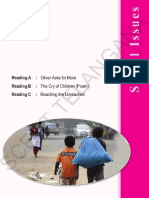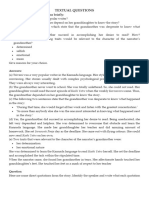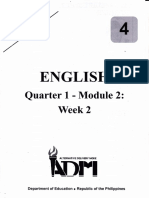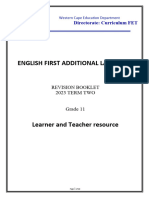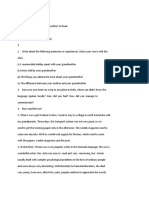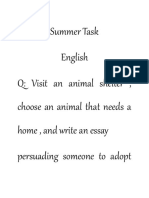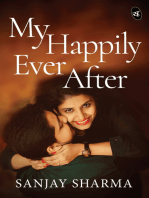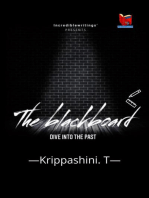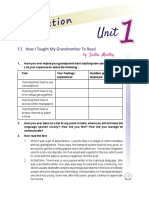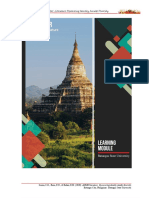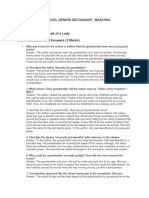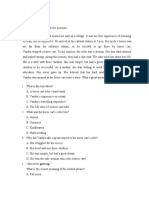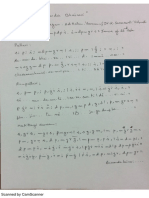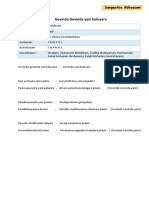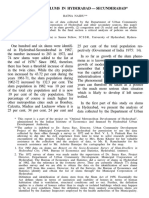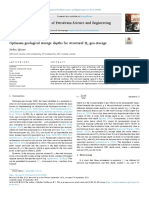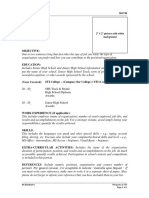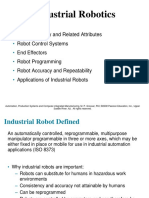English - Unit 7 PDF
English - Unit 7 PDF
Uploaded by
Lakshmi Saranya GollapudiCopyright:
Available Formats
English - Unit 7 PDF
English - Unit 7 PDF
Uploaded by
Lakshmi Saranya GollapudiOriginal Title
Copyright
Available Formats
Share this document
Did you find this document useful?
Is this content inappropriate?
Copyright:
Available Formats
English - Unit 7 PDF
English - Unit 7 PDF
Uploaded by
Lakshmi Saranya GollapudiCopyright:
Available Formats
A
AN
NG
Reading A : Bonsai Life – Part I
LA
Reading B : Bonsai Life – Part II
Reading C : I Can Take Care of Myself
TE
T
ER
SC
Free distribution by T.S. Government 2019-20 105
Women Empowerment
A
Observe the pictures and discuss the questions that follow.
AN
NG
LA
TE
T
ER
SC
1. Who are these people? What do you know about them?
2. What makes a woman empowered?
Oral Discourse: Debate - “Education leads to empowerment of women.”
106 Free distribution by T.S. Government 2019-20
A Reading
A
Bonsai Life
AN
Part I
The moment I see letters waiting for me on the doorstep when I return from work, I
can’t contain my excitement. It’s almost as if I’m face to face with my near and dear ones
and they are speaking affectionately to me. Instantly the exhaustion of office work vanishes
and my heart grows light. Instead of entering the kitchen muttering, ‘Oh no, Oh God’–
NG
which is what I usually do when I come back tired – I feel like singing a song, humming a
tune, making a nice cup of coffee and savouring each sip. What is more, the sight of inland
letters or envelopes in a familiar hand gives me the energy and enthusiasm to quickly make
and eat some pakodas or bajjis! Even though I am lazy about writing letters I love to receive
one from some place or the other, every day.
LA
This is an unexpected letter. If my Akkayya, who doesn’t normally write, went out of
her way to write a letter, there has to be a reason. As I open the letter, I am a little
apprehensive. I hope it is not some bad news. Actually, when things are fine, no one bothers
to write . . .
TE
Ammalu!
You must be very surprised to receive my letter. You would be even more surprised if
I were to tell you that your Baavagaru and I are coming to your place. We have been
planning for quite a while to visit Kasi and Haridwar. We have now found the time. I hope
T
you won’t find our visit inconvenient. . .
“My dear, it seems Akkayya and Baavagaru are coming over,” I said to my husband
ER
excitedly.
“Is that true? When? Where is it? Give me the letter,” he said and pulled the letter
from my hand. I went into the kitchen to get the coffee and other things ready.
Akkayya and Baavagaru were coming to this city and our home for the first time
since my marriage. I had looked forward to their visit all these years. They had never left
SC
their little village to go anywhere. Using children, cattle, cooking etc., as excuses, they had
always avoided moving out. Under such circumstances, imagine their coming to our house
and to this big city!
Akkayya is not as educated as me. By “not as educated” I mean Nannagaru did not let
her study after Class Five. Of what use was education for a girl? Those were the days when
people thought it was enough if a girl was able to keep the washerman’s accounts. A decade
Free distribution by T.S. Government 2019-20 107
later, when I was born, there wasn’t much debate as to whether a girl should have education
or not. I was lucky that my father changed with the times. He didn’t even hesitate to send me
A
to college. No girl who is well educated can be satisfied with staying at home, being a
housewife and looking after the household after marriage. She would want to put her
AN
education to good use and achieve something in life. I too was driven by the same desire.
Even though my husband had a good job, I took up one as well.
Because Akkayya was not educated, she was married to a man from the village. Though
my Baavagaru was educated, his ideals made him choose agriculture as his profession and
he settled down in the village to cultivate his land. Akkayya grew accustomed to the village
NG
life.
Akkayya brought so many things – cucumber, gongura, drumsticks, appadums,
vadiyams and coconuts. “I hope you don’t mind, I have brought you all these things, like
Kuchela. I don’t know whether you’ll like them or not,” she said, rather hesitantly.
“Why do you say that? You’ve actually brought all the things we wanted! We don’t get
LA
these things here.” If your Maridi has gongura pulsu, cucumber pappu and drumstick
charu he feels as elated as if he has had a sumptuous feast! With my office work, I am
unable to make appadams and vadiyams. Even if I have some free time, I am too lazy to do
such work. You know me, don’t you?” I said with a laugh.
TE
‘That’s true, but by the time you come back from office you must be dead tired. How
can you then prepare appadams and vadiyams and make idlis and dosas? I don’t know how
you are able to manage work at home and in the office,” Akkayya consoled me.
“What a wretched job! Sometimes, I feel like giving it up. You know, people say, solve
your problems at home before you solve those outside. To neglect work at home and look
T
after office work is an uphill task for a woman,” I said, speaking from experience.
“Don’t think like that, Ammalu. How fortunate you are! Touchwood! You’ve studied
ER
well, have a job like a man and are earning very well. You don’t have to beg anyone for
anything. You are able to lead a dignified life unlike us who have to depend on our husbands
even for a few paise worth of karivepaku,” said Akkayya.
The grass is greener on the other side, I thought to myself. “What’s your daughter
doing now?” I asked, changing the topic.
SC
“She’s in her final year at school. If by God’s grace she clears her exams, I am
determined to send her to college. Your Baavagaaru doesn’t really like the idea of sending
her to the next town and putting her in a hostel. But I don’t like to keep a girl at home
without educating her. Isn’t what I’m going through enough? In these times, if a woman
doesn’t have a degree, she’ll come to nothing. Without it, she will have to live under her
husband’s thumb, like a scorpion under a slipper,” she said.
108 Free distribution by T.S. Government 2019-20
Glossary
A
exhaustion (n) : extreme tiredness
AN
vanish (v) : disappear
mutter (v) : complain about something privately
savour (v) : enjoy eating
elated (adj) : very happy, excited
NG
sumptuous (adj) : grand
wretched (adj) : very unhappy, miserable
uphill (adj) : difficult
dignified (adj) : deserving respect
LA
n
Comprehensio
3) the statements that are true.
TE
I. Tick (3
1. The narrator receives letters very frequently.
2. The letter brought the news of the narrator’s sister and brother-in-law’s arrival.
3. The narrator’s husband was very happy to hear the news of the visitors.
4. Akkayya was not interested to continue her studies.
T
5. The narrator’s husband likes the traditional food of Andhra Pradesh.
ER
II. Answer the following questions.
1. “The moment I see letters….. can’t contain my excitement.” Why does the
narrator get excited?
2. What change did the narrator observe in her father’s attitude towards education
SC
over a decade?
3. Why was Akkayya determined to send her daughter to college?
4. In what way is the narrator more fortunate than her sister?
5. Can one be independent without a job or earning? Justify your answer.
Free distribution by T.S. Government 2019-20 109
B Reading
A
Bonsai life
AN
Part II
From the very start Akkayya had been keen on studying. But Nannagaru didn’t educate
her. Because she was not adept at oral arithmetic, Nannagaru had said, “Ah ‘she’s a girl,
how will studies get into her head?” and had made her discontinue her lessons concentrating
NG
only on Annayya’s education. Because she was uneducated, she got married to a man from
a village, had to look after the cattle, keep the stove clean, draw water from the well. . .
Amma used to be very upset that Akkayya had to go through such drudgery. Realizing that
Akkayya was upset thinking of the past, and in an attempt to divert her mind, I led her to the
balcony saying, “Come, let’s go and sit outside.”
LA
Looking at the plants in the flowerpots, Akkayya mentioned that all the cucumbers,
drumsticks and gongura were from their own backyard. I asked her to send some gongura
seeds the next time someone came this way…
“But, Ammalu, what’s this? Why have you planted the turayi and pomegranate trees in
TE
these flowerpots? See, how stunted they have become! If, like flower plants, you put these
trees in pots instead of letting them grow freely in the backyard, how will they grow?” she
asked, surprised, feeling sorry for the trees.
I burst into laughter. Akkayya was perplexed.
“I did it on purpose. It’s a special method. It’s called bonsai in Japan. You can grow
T
even a huge banyan tree in a flowerpot. You can
grow it even with its roots hanging down from the
ER
branches. You have no idea how beautiful a
pomegranate tree looks when you keep cutting its
branches, changing the pot now and then, trimming
it into a small-sized tree and making it bear fruit!
Do you know how carefully you have to tend this
SC
small tree? Bonsai is a great art” I said.
But it seemed as if Akkayya didn’t appreciate
what I said. “I don’t know. You have confined a
turayi tree to a flowerpot when it could have grown
to the height of a building,” she sighed.
110 Free distribution by T.S. Government 2019-20
Feeling disheartened at being unable to impress Akkayya with my bonsai, I collapsed
weakly into a chair. I was most distressed – as if the entire art I had learnt had come to
A
nought. It was like throwing perfume into ash. Suddenly a dust storm began to rage. The
sand hit our faces harshly. I caught hold of Akkayya’s shoulder and dragged her into the
AN
room. Then I closed the doors and windows in a hurry.
Akkayya was stunned.
“What’s all this? Everything was normal till now. Where did that dust and wind come
from suddenly? You have tar roads too,” she said.
“This is how it is in the big city, my dear. Before we know what is happening, the storm
NG
brings all the sand from the Rajasathan desert and hits our face. . .” I had not completed my
sentence when I could hear the rain beginning to fall. I opened the door and pulled the
bonsai tree pots and flowerpots inside, under the canopy. Akkayya opened side window and
looked at the streets to observe the weather in the Indian capital. “Look, Ammalu, look
there,” she said. A new enthusiasm seemed to have crept into her voice. I looked eagerly
LA
through the window towards the street. I couldn’t understand what she meant. I looked at
her and said, “What is it?”
“Look at that tree. . . look at how many people are standing under it without getting
wet,” she said, as if it was something out of the ordinary. I saw nothing unusual in it. Realising
TE
that I had not understood what she was getting at, she said again, “Look how tall that turayi
has grown. Out in the open, see how freely it has grown. However powerful the sand storm,
it hasn’t bowed a little bit. Moreover, it has provided shelter to so many people, and is
protecting them. Imagine how
many would find respite from
T
the hot sun under its shade!”
“What’s so surprising
ER
about that?” I asked.
“Not that it is surprising,
Ammalu. Look at the bonsai
you have tended so lovingly! It
SC
looks proper and sweet, like a
housewife. But see how
delicate it is. You have to tend
it very carefully. It can’t even
withstand a small dust storm or
squall. When it is dependent on
Free distribution by T.S. Government 2019-20 111
someone, how can it provide shelter to anyone? Isn’t it because of the difference in the way
one brings up a boy and a girl, that a woman’s life is like that of a bonsai?”
A
My heart was touched by Akkayya’s words. Just as one frees a bird from a cage to let
it fly, I felt the urge to free the bonsai trees from their flower pots.
AN
Original Title: Bonsai Bratukulu by Abburi Chayadevi.
Translated from Telugu by Alladi Uma and M. Sridhar.
About the author
NG
Abburi Chayadevi is a well known feminist writer born in
1933. She has written many short stories and essays. She was awarded
the Central Sahitya Akademi in 2005. In her works, she elucidates
women’s life and their feelings.
LA
Glossary
TE
adept (adj) : a natural ability to do something skilfully
drudgery (n) : hard, boring work
perplex (v) : confuse
nought (n) : nothing / zero
rage (v) : come with force
T
stunted (v) : prevented from growth
canopy (n) : a cover fixed over something for shelter
ER
respite (n) : a short period of rest
squall (n) : a strong wind
n
Comprehensio
SC
I. Complete the statements giving more than one reason.
1. Girls should be educated like boys because...
a) __________________
b) __________________
c) __________________
112 Free distribution by T.S. Government 2019-20
2. Fully grown trees are more useful because...
a) __________________
A
b) __________________
c) __________________
AN
II. Answer the following questions.
1. Why was Akkayya perplexed?
2. How is a bonsai reared?
3. What similarities do you notice between the bonsai tree and the house wife?
NG
4. What made the narrator feel the urge to free the bonsai?
5. What is the central theme of ‘Bonsai Life’?
III. Make a list of activities done by a homemaker and a working woman.
Homemaker Working Woman
LA
TE
IV. 3) mark against the most appropriate meaning for the
Put a tick (3
phrases given below.
1. ‘… to keep the washerman’s account’ means
T
a) to take care of household work.
b) to count clothes.
ER
c) to maintain the washerman’s account.
2. ‘... uphill task’ means
a) high quality work.
b) a difficult job.
SC
c) working on a hill.
3. ‘…… grass is greener on the other side’ means
a) the grass on this side is green.
b) others are as good as we are.
c) others are in a better position than us.
Free distribution by T.S. Government 2019-20 113
4. ‘…like a scorpion under a slipper’ means
a) killing a scorpion with a slipper.
A
b) being guided and controlled.
c) feeling totally suppressed.
AN
Vocabulary
I. Look at the phrasal verb underlined in the following sentence.
“I feel like giving it up. (give up).
NG
What does it mean?
‘Give’ is a verb and ‘up’ is a preposition. Such combinations are called phrasal
verbs. A phrasal verb normally gives a meaning different from the meaning of its
parts.
LA
‘Give up’ means ‘to stop doing something’.
Refer to a dictionary and find out the meaning of some more phrasal verbs beginning
with ‘give’ and ‘look’.
give in ___________ look after ___________
TE
give out ___________ look up ___________
give away___________ look into ___________
Use the above phrasal verbs in your own sentences.
1. _______________________________________________________
T
2. _______________________________________________________
ER
3. _______________________________________________________
4. _______________________________________________________
5. _______________________________________________________
6. _______________________________________________________
SC
II. Look at the simile in the following sentence.
Without it, she will have to live under her husband’s thumb ‘like a scorpion under a
slipper’.
The life of a homemaker is compared to a scorpion under a slipper. When we
compare two things, we often use the word ‘like’.
114 Free distribution by T.S. Government 2019-20
Here are a few more examples of similes.
1. He roars like a lion.
A
2. They eat like wolves.
A. Look at the following similes.
AN
a) bright like a full moon
b) sleep like a log
c) eat like a bird
d) beautiful like a rose
NG
e) sweet like honey
Now write five sentences using the above similes.
1. _______________________________________________________
2. _______________________________________________________
3.
LA
_______________________________________________________
4. _______________________________________________________
5. _______________________________________________________
TE
III. Make some idioms from the words in the circles and use them in your
own sentences, one is done for you.
An idiom is a phrase similar to the phrasal verbs you have learnt in previous class.
It is difficult to guess the meaning of an idiom by looking at the individual words.
T
fish out of the world
thorn water
in
ER
sore back foot
top on
the wall
cat of
flesh
Idiom Sentence
SC
1. fish out of water When he was away from home, he felt like a fish out of water.
2. _____________ _______________________________________
3. _____________ _______________________________________
4. _____________ _______________________________________
5. _____________ _______________________________________
Free distribution by T.S. Government 2019-20 115
Grammar
A
I. Read the sentences.
AN
1. Akkayya grew accustomed to village life.
2. I went into the kitchen.
The words in circles are subjects. The words underlined are predicates.
II. Circle the subjects and underline the predicates.
1. The girls danced.
NG
2. The dark clouds filled the sky.
3. Shiva drove a silver Toyota.
III. Identify subjects and predicates in each of the sentences in the
following paragraph.
The narrator felt very happy to receive her sister and brother-in-law, who came to
LA
stay with them. They brought many things with them. Akkaya made special dishes
for her sister’s husband, which he liked very much. She praised her sister for being
employed and making her living. She was very sorry about her position at home.
One day the narrator showed her Bonsai plants and explained how they are grown
TE
but she did not like it. On a rainy day many people gathered under a tree to take
shelter. Showing this, Akkaya made the narrator understand the importance of
freedom in one’s life.
Writing
T
Look at the following poster.
ER
Handicrafts Exhibition Cum Sale
Innovative and original products by the crafts women from all over Telangana.
SC
NO ENTRY FEE
From 15th to 25th October
Inauguration: By Hon’ble Home Minister. ALL ARE
WELCOME
Time: 4 p.m. on 15th October
Venue: People’s Plaza, Necklace Road, Hyderabad.
T.S. DWACRA, Arunodaya building, Nampally, Hyderabad.
116 Free distribution by T.S. Government 2019-20
List the features of this poster.
e.g. Who has issued the poster? What is it about?
A
The date, time, place of the event, layout and nature of the sentences.
I. Now, make a poster based on the information given below.
AN
1. Issuing authority : Telangana Arts and Crafts Society , Nizamabad.
2. Event : Dance performance by Aarthi.
3. Date : November 14.
4. Chief Guest : Honourable Chief Minister of Telangana.
NG
5. Venue : Rajiv Gandhi Auditorium, Khaleelwadi, Nizamabad.
Listening
Listen to the debate on the topic ‘Education of the Girl Child Is a
Burden’.
LA
Now, complete the table based on the information you’ve just listened to:
TE
Arguments
For Against
Speaker 1
Speaker 2
T
Speaker 1
ER
Speaker 2
Speaker 1
Speaker 2
SC
Free distribution by T.S. Government 2019-20 117
C Reading
A
I Can Take Care of Myself
AN
Once upon a time, there was a mother rat who wanted to get her young daughter married
as soon as possible, to the most powerful being that she could find. ‘Who is the most
powerful being on earth?' she asked herself. She saw the bright sun god travelling across
the sky, and thought, 'Surely, all beings depend on the sun. The sun god is the most powerful
NG
being on this earth.' She asked the sun god, 'Are you the most powerful being on this earth?'
He smiled, 'No, there is someone greater than me to help the creatures - it is the rain.
Without the rain, no crop or tree would grow. There would be no water on earth.'
Just then, it began to rain. She thought, "How
wonderful the rain is! It makes the whole land green.
LA It makes the rivers flow. Surely, the rain god is the
most powerful being on this earth. She asked the rain
god, 'Are you the most powerful being on this earth?
He smiled, 'No, there is someone greater than me to
TE
help the creatures- it is the mountain. Without the
mountain, there would be no protection for the
creatures of this earth. The mountain blocks the
clouds, and lets the water flow
safely for the people and all
T
life in the valleys.'
She looked around, and
ER
saw the beautiful blue
mountain. She thought, "How
big and strong the mountain
is! It withstands all winds
and storms. It protects the earth and its
SC
creatures. Surely, the mountain god is the most powerful being on
this earth. 'She asked the mountain god, ‘Are you the most powerful
being on this earth?' He smiled, ‘No, there is someone greater
than me to help the creatures-it is the worm. Without the worm,
the earth would be hard and nothing would grow in the soil. The
earthworm is the greatest friend that living beings can have.’
118 Free distribution by T.S. Government 2019-20
Just then, she saw her daughter coming towards her.
She asked her mother, ‘What are you doing?’
A
‘I am trying to find out who the most powerful being
on earth is’, said the mother.
AN
‘Why?’ asked her daughter. ‘I want you to marry him
and be safe,’ said the mother.
‘Why would I need to marry to be safe?’ asked the
daughter. ‘To be safe, I need to know how to take care of
myself.'
NG
'You are small. You need protection’, said the mother rat.
‘The best protection is to be able to protect oneself,' said
the daughter. ‘To protect myself,
I need to learn to be strong and
work hard.’
LA
'But why would you need to work? If you marry
someone rich and powerful, he will support you’, said the
mother rat.' 'Who is rich and powerful, amma?' asked the
TE
daughter. ‘The truly powerful being is one who can take care
of oneself and those she loves. One is truly rich, if one is
rich in love. I want to be powerful myself, so that I can take
care of myself and those that I love.'
The mother rat was confused. ‘What will you do?’ she
T
asked. 'I will learn to stand on my own feet. I will find work
to do that supports me, and my family. For that, I need to
ER
learn more about the world, and learn to live in it as a good
creature. Let me first learn to take care of myself.’
‘But don't you need help?’ asked the mother rat.
‘Yes, from you, amma!’ said the daughter. 'Help me
support myself. I am not interested in marrying
SC
anybody, rich or powerful. Depending on another
person's power, position or prosperity does not
promise peace and security in the long run.
One has to depend on the power within
oneself to seek the target in one's life.'
Free distribution by T.S. Government 2019-20 119
n
Comprehensio
A
Answer the following questions.
AN
1. What do you think is the most important thing to learn to live well ?
2. What are the skills or qualities that would help you to be independent in your life?
3. Do you agree/ disagree with the daughter of the mother rat? Give reasons for your
response.
NG
Study Skills
I. Observe the data given in the bar diagrams related to male and female
infant mortality rates (IMR) in India over the years 1990 to 2008 and
answer the questions given.
LA
TE
T
ER
(Source: Ministry of Statistics and Programme Implementation National Statistical Organisation - Website:
www.mospi.gov.in)
1. In which year is the difference in infant mortality rates between male and female
SC
the highest?
2. In which case and in which year do we find a sudden decrease in the IMR?
3. What will happen if there is a wide gap in IMR between male and female?
4. What, according to you, may the reasons be for the female IMR being higher than
the male IMR?
5. What may the reasons be for the decrease in IMR over the years?
120 Free distribution by T.S. Government 2019-20
6. Do you think there could be a further decrease in the IMR after 5 years?
7. What, according to you, may the reasons be for the death of more than half of both
A
male and female infants?
II. Group work.
Discuss the above questions in your group and write an analytical
AN
report on the Infant Mortality Rates in India.
Oral Activity
A. Debate on the following proposition.
NG
“Reservation in education, employment and legislature will empower the women.”
B. Given below are 4 different statements. Give your opinion and discuss
with your classmates.
1. Interest in music, dance and sports distract from studies.
2. One should not be punished for telling the truth.
3.
LA
When an older person says something, we should blindly obey.
4. It is wrong for actors to model for cigarettes and fairness creams.
Project Work
TE
A. Interview some female members in your family and neighbourhood
with the following questions.
Would you like the girls in the family to take up a job after they have received
education?
If yes, give some reasons.
T
____________________________________________________________
If no, give some reasons.
ER
____________________________________________________________
B. Work on the following items.
Note down whether the woman you have interviewed is educated or uneducated;
working / not working; married / unmarried.
SC
Sl.No. Name Working Not working Opinion
C. Based on the above information write a report on ‘Woman Empowerment’and
present it to the class.
Free distribution by T.S. Government 2019-20 121
Self Assessment
How well have I understood this unit?
A
9 ) in the appropriate box.
Read and tick (9
Indicators Yes Somewhat No
AN
I read and understood the text:
A. Bonsai Life
B. Bonsai Life
C. I can Take Care of Myself
NG
I was able to understand and use the phrasal verbs given
under 'Vocabulary'.
I was able to frame idioms given under 'Vocabulary'.
I was able to understand and identify subject and predicate given
under 'Grammar'.
LA
I was able to write a poster given under 'Writing'.
I was able to understand the debate given under 'Listening'.
I listened to and understood
“Education of the Girl Child is a Burden” and answered the
TE
questions given under 'Listening'.
I was able to participate in a debate given under 'Oral Activity'.
I was able to interview the neighbourhood women given
under 'Project Work'.
T
Our qualities and intelligences help us live will. ‘Personal Body Safety’ Rules help us be
safe. These are:
ER
1. Clothing rules- We keep private parts covered in front of others. Though we don’t
cover our mouth, it is private too.
2. Touching rules – We don’t touch private parts in front of others.
3. Talking rules – We talk about private parts with Safe Adults.
If someone breaks ‘Personal Body safety Rules’, I can say ‘No’ to that person; GO away
SC
from that person as and when I can; TELL a safe adult about this person because he/she is
doing something unsafe and has to be stopped.
I am a safe person if I follow Personal Body Safety Rules for myself and for others.
Sometimes people may trouble us by breaking these rules. We may feel ashamed and find
it difficult to speak about it to others. Remember that shame and blame are not in the
body. Those who trouble us are the ones to be blamed and need to feel ashamed of their
behaviour. Our laws (example POCSO Act 2012) prescribe punishment for such offenders.
122 Free distribution by T.S. Government 2019-20
You might also like
- Varaveena GeethamDocument1 pageVaraveena GeethamLakshmi Saranya Gollapudi89% (9)
- The Diary of Ma Yan: The Struggles and Hopes of a Chinese SchoolgirlFrom EverandThe Diary of Ma Yan: The Struggles and Hopes of a Chinese SchoolgirlRating: 4 out of 5 stars4/5 (4)
- Parts of Boiler and Their FunctionDocument4 pagesParts of Boiler and Their FunctionsadNo ratings yet
- Syamale Meenakshi: Ragam: Sankarabharanam Talam: Aadi 29Th Melakartha Janaka RagamDocument3 pagesSyamale Meenakshi: Ragam: Sankarabharanam Talam: Aadi 29Th Melakartha Janaka RagamLakshmi Saranya GollapudiNo ratings yet
- ViriboniDocument3 pagesViriboniLakshmi Saranya GollapudiNo ratings yet
- Sri GovindaDocument1 pageSri GovindaLakshmi Saranya Gollapudi100% (1)
- English - Unit 3 PDFDocument18 pagesEnglish - Unit 3 PDFLakshmi Saranya Gollapudi100% (1)
- English - Unit 2 PDFDocument16 pagesEnglish - Unit 2 PDFLakshmi Saranya GollapudiNo ratings yet
- Myanmar-Fiction 1Document6 pagesMyanmar-Fiction 1Chezka BristolNo ratings yet
- Class 11 Chapter 1 English Hornbill Important QuestionsDocument5 pagesClass 11 Chapter 1 English Hornbill Important Questionsmadhu santoshNo ratings yet
- Textual Questions How I Taught My Grandmother To ReadDocument5 pagesTextual Questions How I Taught My Grandmother To Readjain.hriyaanshNo ratings yet
- Challenge to Excellence: A Survival Guide for Teenagers and ParentsFrom EverandChallenge to Excellence: A Survival Guide for Teenagers and ParentsNo ratings yet
- STD - 11 Unit - I Prose The Portrait of A LadyDocument3 pagesSTD - 11 Unit - I Prose The Portrait of A LadyHarini JNo ratings yet
- Hornbill LN The Portrait of A Lady - NotesDocument6 pagesHornbill LN The Portrait of A Lady - NotesSrihari SNo ratings yet
- The BlanketDocument4 pagesThe BlanketBilal AwanNo ratings yet
- 03 Bhs Inggris Paket ADocument15 pages03 Bhs Inggris Paket AAbang izuLNo ratings yet
- 03 Bhs Inggris Paket ADocument15 pages03 Bhs Inggris Paket AAbang izuLNo ratings yet
- English 4-Module 2Document18 pagesEnglish 4-Module 2Hans Derick ValdezNo ratings yet
- Two Halves of A WholeDocument44 pagesTwo Halves of A Wholeeastm938No ratings yet
- Main Book LR IXDocument140 pagesMain Book LR IXVarun DavuluriNo ratings yet
- A N T (Anthony Now Teaches): The Teacher Who Hates Reading and WritingFrom EverandA N T (Anthony Now Teaches): The Teacher Who Hates Reading and WritingNo ratings yet
- The Good, the Bad and the Innocent: The Tragic Reality Behind Residential SchoolsFrom EverandThe Good, the Bad and the Innocent: The Tragic Reality Behind Residential SchoolsRating: 5 out of 5 stars5/5 (1)
- English FAL Grade 11 Revision Term 2 - 2023Document23 pagesEnglish FAL Grade 11 Revision Term 2 - 2023jordangardneris11No ratings yet
- English Paragraph WritingDocument14 pagesEnglish Paragraph Writingyazhiniraja12345No ratings yet
- Class 9 English Literature Reader SollutionDocument218 pagesClass 9 English Literature Reader Sollutiontapas7798No ratings yet
- English Class 9 Question and AnswersDocument301 pagesEnglish Class 9 Question and Answersglorubaby2007No ratings yet
- English FAL Grade 11 Revision Term 2 - 2024Document22 pagesEnglish FAL Grade 11 Revision Term 2 - 2024gautamalowaNo ratings yet
- Soal BSG Xi Ganjil 2022-2023Document8 pagesSoal BSG Xi Ganjil 2022-2023Agus DarmintoNo ratings yet
- Soal Upk B.ing Paket C 2022Document20 pagesSoal Upk B.ing Paket C 2022Mardin AliNo ratings yet
- Kementerian Agama Republik Indonesia: Penilaian Akhir Semester Ganjil Madrasah Aliyah TAHUN PELAJARAN 2020-2021Document7 pagesKementerian Agama Republik Indonesia: Penilaian Akhir Semester Ganjil Madrasah Aliyah TAHUN PELAJARAN 2020-2021Aisyah DNo ratings yet
- How I Taught My Grandfather To Read AnswersDocument4 pagesHow I Taught My Grandfather To Read AnswersmanojboaNo ratings yet
- How I Taught My Grandmother To ReadDocument6 pagesHow I Taught My Grandmother To ReadAnshul Kumar50% (4)
- 18 Safia AkhtarDocument13 pages18 Safia AkhtarNimra Rafique100% (1)
- English Summer Task7Document40 pagesEnglish Summer Task7Iconic SoulmasterNo ratings yet
- HOTS ON FIRST FLIGHTDocument4 pagesHOTS ON FIRST FLIGHTsaanvi061227No ratings yet
- How I Taught My Grandmother To ReadDocument4 pagesHow I Taught My Grandmother To ReadShamala Mathias0% (1)
- Maya - Illusion (Behind The Smile): The Story of Lek of Lek, a Bar Girl in PattayaFrom EverandMaya - Illusion (Behind The Smile): The Story of Lek of Lek, a Bar Girl in PattayaNo ratings yet
- EnglishDocument107 pagesEnglishGOPAL SINo ratings yet
- English - Unit 1Document14 pagesEnglish - Unit 1Lakshmi Saranya Gollapudi100% (1)
- God's Greatest Gift of Love: On Mixed Feelings of Hurt and PainFrom EverandGod's Greatest Gift of Love: On Mixed Feelings of Hurt and PainNo ratings yet
- English-Literature - 2022-IX (1) - 18-27Document10 pagesEnglish-Literature - 2022-IX (1) - 18-27HIMESH POTNURUNo ratings yet
- The Portrait of A LadyDocument7 pagesThe Portrait of A Ladyamandeeparman32No ratings yet
- Big Reader Alice WalkerDocument6 pagesBig Reader Alice WalkerAnita VincentNo ratings yet
- soal ujian bahasa inggrisDocument15 pagessoal ujian bahasa inggrisfitrisusanti03No ratings yet
- Soal Tanpa KunciDocument18 pagesSoal Tanpa KunciDahlia DahliaNo ratings yet
- Asean Discovering Identity Amidst Diversity: LiteratureDocument20 pagesAsean Discovering Identity Amidst Diversity: LiteratureBlack BullNo ratings yet
- Class - 9 - Assignment - 1 - 2023-24Document47 pagesClass - 9 - Assignment - 1 - 2023-24Sinchani SilNo ratings yet
- Class XI Module Unit-1Document17 pagesClass XI Module Unit-1manomani007123No ratings yet
- Kelas 10 BingDocument9 pagesKelas 10 BingMegariaNo ratings yet
- SoalDocument7 pagesSoalShinta SyarahviNo ratings yet
- Daatuswaras - 1 SpeedDocument3 pagesDaatuswaras - 1 SpeedLakshmi Saranya Gollapudi100% (1)
- Muddugaare YashodaDocument1 pageMuddugaare YashodaLakshmi Saranya GollapudiNo ratings yet
- 14 BibliographyDocument7 pages14 BibliographyLakshmi Saranya GollapudiNo ratings yet
- Ananda BhairawiDocument2 pagesAnanda BhairawiLakshmi Saranya GollapudiNo ratings yet
- Itti Muddu - Aananda Bhairavi - AdiDocument1 pageItti Muddu - Aananda Bhairavi - AdiLakshmi Saranya GollapudiNo ratings yet
- Govinda Govinda YaniDocument1 pageGovinda Govinda YaniLakshmi Saranya Gollapudi0% (1)
- Kalaya Kalyaanaani - Naada Naama KriyaDocument1 pageKalaya Kalyaanaani - Naada Naama KriyaLakshmi Saranya GollapudiNo ratings yet
- Govinda Ghataya - KambhojiDocument1 pageGovinda Ghataya - KambhojiLakshmi Saranya GollapudiNo ratings yet
- Achyutham Keshavam: Ragam Sankarabharanam Talam Chaturasrajaathi Adi TalamDocument1 pageAchyutham Keshavam: Ragam Sankarabharanam Talam Chaturasrajaathi Adi TalamLakshmi Saranya GollapudiNo ratings yet
- Devi Lakshmi Maam Paahi - Mohana - AdiDocument1 pageDevi Lakshmi Maam Paahi - Mohana - AdiLakshmi Saranya GollapudiNo ratings yet
- Prabhum Praana Naadam - Sivashtakam - MohanaDocument2 pagesPrabhum Praana Naadam - Sivashtakam - MohanaLakshmi Saranya GollapudiNo ratings yet
- Music Grade 2 MadyamikaDocument310 pagesMusic Grade 2 MadyamikaLakshmi Saranya Gollapudi0% (1)
- eCRF Design: Best Practices: White PaperDocument4 pageseCRF Design: Best Practices: White PaperLakshmi Saranya GollapudiNo ratings yet
- Creating Your Own LibraryDocument13 pagesCreating Your Own LibraryLakshmi Saranya GollapudiNo ratings yet
- Madhurapuri NilayeDocument1 pageMadhurapuri NilayeLakshmi Saranya GollapudiNo ratings yet
- Niraakaara NiranjaniDocument1 pageNiraakaara NiranjaniLakshmi Saranya GollapudiNo ratings yet
- Fish Data DescriptionDocument2 pagesFish Data DescriptionLakshmi Saranya GollapudiNo ratings yet
- English - Unit 4Document20 pagesEnglish - Unit 4Lakshmi Saranya GollapudiNo ratings yet
- Uppers Thay Is War AsDocument3 pagesUppers Thay Is War AsLakshmi Saranya GollapudiNo ratings yet
- Slide 1 638Document1 pageSlide 1 638Lakshmi Saranya GollapudiNo ratings yet
- Srilu Pongina Jeeva Gaddai: Lyrics: Sri Rayaprolu Subbarao GaruDocument2 pagesSrilu Pongina Jeeva Gaddai: Lyrics: Sri Rayaprolu Subbarao GaruLakshmi Saranya GollapudiNo ratings yet
- English - Unit 5 PDFDocument16 pagesEnglish - Unit 5 PDFLakshmi Saranya GollapudiNo ratings yet
- English - Unit 4Document20 pagesEnglish - Unit 4Lakshmi Saranya GollapudiNo ratings yet
- English - Unit 8Document19 pagesEnglish - Unit 8Lakshmi Saranya GollapudiNo ratings yet
- Introduction To The Flora and Fauna of OdishaDocument11 pagesIntroduction To The Flora and Fauna of Odishajitendramakwana350No ratings yet
- PW160 7Document24 pagesPW160 7Baciu SorinNo ratings yet
- Instructor Mr. Sohaib LatifDocument20 pagesInstructor Mr. Sohaib LatifHafsa KhanNo ratings yet
- A Study of Slums in Hyderabad - SecunderabadDocument16 pagesA Study of Slums in Hyderabad - SecunderabadVishnu Thipparthi100% (1)
- MV. Tan Binh 129Document19 pagesMV. Tan Binh 129Dean Delon NanlohyNo ratings yet
- Example of Middle School Science Fair Research PaperDocument8 pagesExample of Middle School Science Fair Research Paperefdwvgt4No ratings yet
- Gear MeasurementDocument24 pagesGear MeasurementMomen hossainNo ratings yet
- How 20 To 20 Have 20 An 20 Inclusive 20 Meeting 20 FlyerDocument1 pageHow 20 To 20 Have 20 An 20 Inclusive 20 Meeting 20 FlyerDr. Erwin HandokoNo ratings yet
- GroupsWorkbookTogetherv 2,01Document41 pagesGroupsWorkbookTogetherv 2,01Anonymous Ax12P2srNo ratings yet
- Report Project 1Document25 pagesReport Project 1Nurul NadiahNo ratings yet
- Pre-Oral Defense ScriptDocument2 pagesPre-Oral Defense ScriptNigel MadriñanNo ratings yet
- 570st - Tractor Loader Backhoe (08/16 - ) 84 - Booms, Dippers & Buckets 84.114.af (04) - Swing Cylinders Sub AssyDocument3 pages570st - Tractor Loader Backhoe (08/16 - ) 84 - Booms, Dippers & Buckets 84.114.af (04) - Swing Cylinders Sub AssyСтаниславNo ratings yet
- NMHB2020 RevDocument282 pagesNMHB2020 RevNot HarryNo ratings yet
- IGLAUER STEFAN 2022 Optimum Geological Storage Depths For Structural H2 Geo-StorageDocument4 pagesIGLAUER STEFAN 2022 Optimum Geological Storage Depths For Structural H2 Geo-Storagekennedy antwiNo ratings yet
- Indian Space Research Organisation (Isro) Bangalore, India: Application FormDocument3 pagesIndian Space Research Organisation (Isro) Bangalore, India: Application FormDurga Rao VedullapalliNo ratings yet
- FM FinalDocument87 pagesFM FinalGaurav S JadhavNo ratings yet
- A Case Presentation On A Mediastinal MassDocument51 pagesA Case Presentation On A Mediastinal MassJon Francis CoNo ratings yet
- Final Report On City Development and Slum Upgradation Strategy of BengaluruDocument64 pagesFinal Report On City Development and Slum Upgradation Strategy of BengaluruKavya KaladharanNo ratings yet
- PPP Screening Manual: Public Private Partnership (Prime Minister's Office)Document61 pagesPPP Screening Manual: Public Private Partnership (Prime Minister's Office)M M FerdousNo ratings yet
- Workplace Safety EditedDocument19 pagesWorkplace Safety EditedRio Moseh ErikNo ratings yet
- Damage in Concrete Due To Faulty WorkmanshipDocument2 pagesDamage in Concrete Due To Faulty WorkmanshipBhanu Chandu MakineniNo ratings yet
- Cybergeneration - MidwitchesDocument4 pagesCybergeneration - MidwitchesAlex PriscinaNo ratings yet
- Jis B 1196Document19 pagesJis B 1196Luis PabonNo ratings yet
- An Outsider's Perspective On GRBLDocument5 pagesAn Outsider's Perspective On GRBLcory ahumadaNo ratings yet
- Address Telephone Numbers Email Address: 2" X 2" Picture With White BackgroundDocument1 pageAddress Telephone Numbers Email Address: 2" X 2" Picture With White BackgroundHannagen SabanganNo ratings yet
- Industrial RoboticsDocument45 pagesIndustrial Roboticshimanshu singhNo ratings yet
- Session 5b Hazard Vulnerability Assessments 1 Slide PPDocument31 pagesSession 5b Hazard Vulnerability Assessments 1 Slide PPPuskesmas kesesi1No ratings yet
- Section 8 Boilout.Document7 pagesSection 8 Boilout.Mithilesh Yadav100% (1)
- Basics of Pressure Piping For Junior EngineersDocument36 pagesBasics of Pressure Piping For Junior Engineersتدریس زبان ESLNo ratings yet







